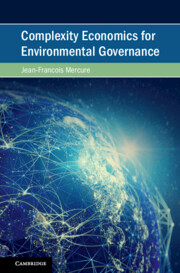Book contents
- Frontmatter
- Contents
- Figures
- Tables
- Preface
- Acknowledgements
- Part I The State of Knowledge and its use in Environmental Economics
- 1 Introducing Complex Environmental Economics
- 2 Complexity, Heterogeneity and Uncertainty as Basis for Policy Analysis
- 3 Modelling Innovation and the Macroeconomics of Low-Carbon Transitions: Equilibrium and Non-equilibrium Paradigms
- 4 Philosophies of Science and the Policy Cycle
- Part II A Positive Theory for Complexity Economics
- Part III Applied Complexity Economics for Environmental Governance
- References
- Index
2 - Complexity, Heterogeneity and Uncertainty as Basis for Policy Analysis
from Part I - The State of Knowledge and its use in Environmental Economics
Published online by Cambridge University Press: 03 November 2022
- Frontmatter
- Contents
- Figures
- Tables
- Preface
- Acknowledgements
- Part I The State of Knowledge and its use in Environmental Economics
- 1 Introducing Complex Environmental Economics
- 2 Complexity, Heterogeneity and Uncertainty as Basis for Policy Analysis
- 3 Modelling Innovation and the Macroeconomics of Low-Carbon Transitions: Equilibrium and Non-equilibrium Paradigms
- 4 Philosophies of Science and the Policy Cycle
- Part II A Positive Theory for Complexity Economics
- Part III Applied Complexity Economics for Environmental Governance
- References
- Index
Summary
This chapter raises key questions on the current state of practice in policy appraisal and analysis, in academia and government. It proposes a fundamental methodological shift in the modelling of policy interventions for sustainability transitions in order to account for complexity, uncertainty and agent heterogeneity. It identifies the main shortcomings of present methods of the equilibrium and optimisation-based approaches most frequently used to inform sustainability policy: (i) their normative, optimisation-based nature, (ii) their unrealistic reliance on the full-rationality of agents, (iii) their inability to capture self-reinforcing feedback processes, (iv) their inability to represent multiple solutions and path-dependency, and (v) their inability to properly account for agent heterogeneity. A proposal is made for dynamical systems analysis in policy appraisal that could lead to a paradigm shift in the ability of governments to understand and solve complex environmental issues.
- Type
- Chapter
- Information
- Complexity Economics for Environmental Governance , pp. 25 - 49Publisher: Cambridge University PressPrint publication year: 2022



